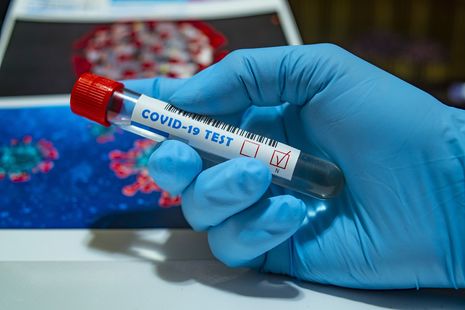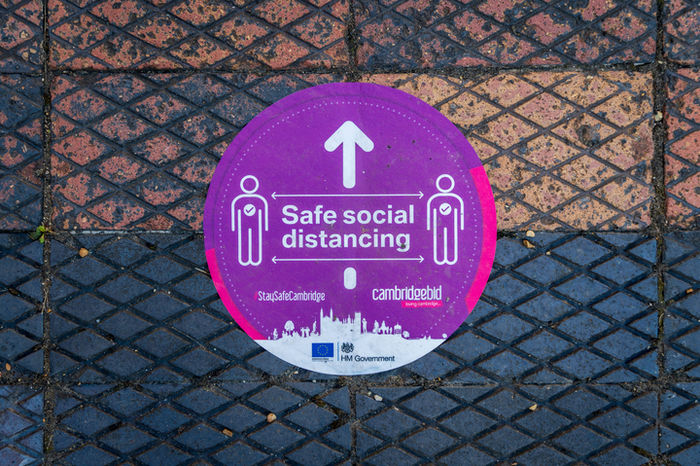Cambridge to offer weekly Covid-19 tests to students living in college accommodation
The University will offer all students living in college accommodation a weekly test for SARS-CoV-2, even if they are asymptomatic

The University has announced plans to offer weekly Covid-19 testing to all students living in college accommodation, even if they are asymptomatic.
The announcement comes as concern grows about increasing coronavirus infection rates amongst young people. Data from Public Health England indicates that 20-29-year-olds are currently the age group most likely to be infected, with cases in this age group tripling by the end of August compared to the first week of July.
The tests will be offered to all students living in college accommodation, even if they are not showing any symptoms, as part of the ‘Stay Safe Cambridge Uni’ public health initiative. This is because “it is possible for people to spread the virus and infect others even if they are unaware that they themselves are infected,” said Professor Patrick Maxwell, Head of the School of Clinical Medicine, in an email to all students this afternoon.
When term begins on 8th October, around 16,000 students will be resident in accommodation across Cambridge’s 31 colleges.
The tests will be self-administered swab samples of the throat and nose. The samples will then be pooled by household, defined as “a unit where students share communal facilities, such as bathroom or kitchen”, helping to reduce the total number of samples that need to be analysed. By pooling households in this way, the number of tests will be reduced to around 2,000 per week.
If the pooled sample tests positive then the affected students will be contacted within 24 hours and offered individual tests. All the students within the household will be asked to isolate in accordance with national guidance.
Testing will be voluntary, but the University will “encourage everyone to take part” and “anticipate that the majority of students will do so.”
The test results, if positive, ‘will also trigger NHS Test and Trace’.
The University of East Anglia recently announced that it will provide tests at the start of term, whilst the University of Leicester announced its intention to test students but is still finalising plans.
Vice-Chancellor Stephen Toope said that the University wants “to reassure” returning students “and the wider local community” that the University is taking measures with regards to COVID-19. He added, “this screening programme is just one of a number of measures that we are putting in place to keep our University and city safe”.
The tests will not be offered to those living in private accommodation, states Maxwell, because “the risk of transmission and outbreaks is expected to be higher in college accommodation, where the density of students and potential for interactions are greater.”
This college-limited approach has raised concerns about accessibility for students who live in private accommodation.
Cambridge University Student Union (SU) said that although they welcomed the screening programme, it “does not go far enough to tackle the challenges facing us next term.”
They continued: “One of the key demands in our #DemandSafeCambridge campaign was for regular and ongoing COVID-19 testing ‘for all staff, students and the local community’. The University’s current program however, only tests students living in College halls, meaning that the over 6000 students living outside University accommodation, as well as academic and non-academic staff will not be covered in this program - despite all of these groups coming into frequent contact with students living in University accommodation”.
In recent weeks, the start of term for US Universities has seen several colleges pull in-person teaching following outbreaks of COVID-19.
Last week, the UK’s Scientific Advisory Group for Emergencies (SAGE) warned about risks of transmission in higher education settings. The report warned that ‘there is a significant risk that Higher Education… could amplify local and national transmission’ so ‘it is essential to develop clear strategies for testing and tracing’.
Today’s announcement also comes on the day that Health Secretary, Matt Hancock, criticised asymptomatic people from using coronavirus testing services. In an interview with Sky News this morning, Hancock said: ‘In the last couple of weeks we have seen an increase in demand, including an increase in demand from people who are not eligible for tests: people who don’t have symptoms. You are eligible for a test if you have symptoms of coronavirus or if you have very specific reasons otherwise… about 25% of people coming forwards don’t have symptoms’.
Previous to today’s announcement, Cambridge students have already had greater access to Covid-19 testing than the general public. Since 29th June, undergraduate and postgraduate students present in Cambridge have been able to be tested if they had ‘flu-like’ symptoms.
 News / Night Climbers call for Cambridge to cut ties with Israel in new stunt15 April 2024
News / Night Climbers call for Cambridge to cut ties with Israel in new stunt15 April 2024 News / Cambridge University cancer hospital opposed by environmental agency12 April 2024
News / Cambridge University cancer hospital opposed by environmental agency12 April 2024 Features / Cambridge’s first Foundation Year students: where are they now?7 April 2024
Features / Cambridge’s first Foundation Year students: where are they now?7 April 2024 Film & TV / Dune: Part Two is a true epic for the ages11 April 2024
Film & TV / Dune: Part Two is a true epic for the ages11 April 2024 Comment / UK universities are sacrificing widening access for foreign fees11 April 2024
Comment / UK universities are sacrificing widening access for foreign fees11 April 2024




